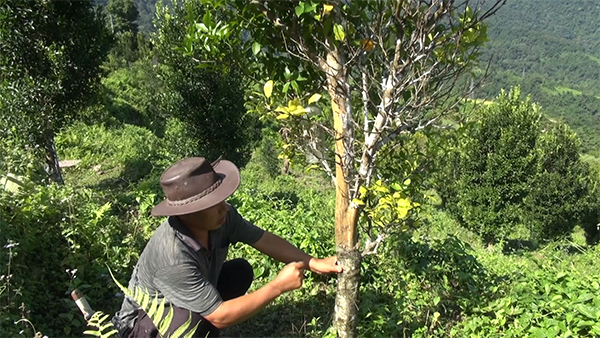 It is almost time to harvest oranges in Zhemgang, which is one of the main cash crops for farmers in the district. But in Tshanglajong village of Trong Gewog, orange growers aren’t that excited. Orange production in the village has been decreasing for the past few years. Farmers say it is because of the increasing invasion from Sambar deer.
It is almost time to harvest oranges in Zhemgang, which is one of the main cash crops for farmers in the district. But in Tshanglajong village of Trong Gewog, orange growers aren’t that excited. Orange production in the village has been decreasing for the past few years. Farmers say it is because of the increasing invasion from Sambar deer.
It is the young fruiting orange trees that the Sambar deer target. Farmers say they feed on the barks of young trees. And once the trees are damaged, they mostly die. Those that survive do not fruit well.
Farmers say they guard their orange trees day and night against the deer. The damage this year has been huge.
One of the farmers Sonam Dorji says the deer usually come at around 11 or 12 at night. “This year almost all the trees have been damaged by the deer. The production has also dropped,” he said.
Another orange grower Dorji Wangchuk said they are not expecting to earn much this year. “All our orange trees have been damaged by the deer, and now our income will be nil. This is after all our hard work and the huge expenses we incurred. We feel discouraged and hopeless now.”
Some of the farmers have lost thousands of orange trees to the animals. People are now trying out all sorts of means like using manure on the damaged trees and hanging plastic bottles to fend off the animals.
“We were told by the village elders that covering the damaged trees with a cloth mixed with the cow dung helps them recover,” said Dorji Wangchuk.
“We tried using nets around our orchard but that didn’t seem to work. We also tried using cow dung and other methods but they weren’t effective,” said Sonam Dorji.
The people are now hoping the officials will come to their aid. There are more than 30 households in Tshanglajong.
The entire Zhemgang district falls inside the territory of the Royal Manas National Park which is home to the Sambar deer. According to a park official, there is no study carried out to know why sambar deer feed on orange trees.
Pema Samdrup, Zhemgang
Edited by Yeshi Gyaltshen





